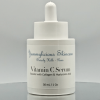The Hidden Power of Hydration
Water Is the Foundation of Healthy, Glowing Skin
Hydration is not a trend — it’s a biological requirement.
Your skin depends on water to look its best, heal efficiently, and age gracefully. By combining internal hydration with effective, nutrient-dense skincare, you create the environment your skin needs to thrive.
Your skin is thirsty.
Every day, you lose water through breathing, sweating, talking — and yes, through your skin. And when that water isn’t replenished, your skin sends clear signals: dullness, tightness, flaking, or fine lines that seem to appear out of nowhere.
Hydration isn’t just about drinking water or slathering on moisturizer — it’s about understanding how water moves through your skin and how to support that process from both the inside and the outside.
Why Hydration Matters for Skin Health
Water plays a critical role in every layer of your skin — from the deepest structures to the outermost barrier. Without enough hydration:
√ Skin loses its plumpness and begins to sag
√ Fine lines and wrinkles become more visible
√ Texture becomes rough, flaky, or tight
√ Your natural barrier function weakens, making skin more reactive to irritation or environmental damage
And yet, most of us don’t hydrate nearly enough.
What Happens When You’re Dehydrated?
The Epidermis Loses Water First
The outermost layer of your skin — the stratum corneum — holds water with the help of Natural Moisturizing Factors (NMF) like urea, amino acids, and lactic acid1. When you’re dehydrated, this layer becomes brittle and uneven, leading to roughness and sensitivity.
The Dermis Loses Volume
The dermis — the deeper layer that contains collagen, elastin, and hyaluronic acid — relies on water to maintain structure. Without it, skin looks sunken, less elastic, and more fatigued2.
Trans-Epidermal Water Loss (TEWL) Increases
When the skin’s barrier is compromised, water escapes more easily — a process known as TEWL3. This means your skin can lose hydration even faster than you’re replacing it, especially in dry or polluted environments.
| “Hydration is the foundation of every skincare routine. Without it, nothing else works quite the same.”
Water vs. Moisturizer: What’s the Difference?
Let’s clear something up: Drinking water is essential, but it’s not enough on its own to keep your skin hydrated. That’s because once water reaches the outermost layer of skin, it evaporates quickly — unless it’s sealed in with topical support.
You need hydration from two directions:
√ Internally — by drinking enough water, herbal teas, or water-rich fruits and vegetables
√ Topically — by applying products that attract water (humectants), seal it in (emollients), and strengthen the barrier (occlusives)
The Role of Skincare in Hydration
High-quality hydrating products do more than just sit on the skin — they help manage water flow, prevent evaporation, and strengthen the skin barrier.
Key Ingredients to Look For:
√ Hyaluronic Acid – A humectant that binds 1,000x its weight in water[4]
√ Collagen & Peptides – Help retain water in the dermal layer
√ Aloe Vera, Glycerin, Rosehip Oil – Soothing, plant-based humectants and emollients
√ Ceramides & Shea Butter – Strengthen the skin’s lipid barrier to reduce water loss
The Yummylicious Approach to Hydration
Our philosophy is simple: hydration should be gentle, effective, and layered. That’s why our formulations combine humectants, emollients, and nutrient-rich botanicals — in pure, undiluted concentrations — to help your skin stay plump, elastic, and luminous.
Here are a few of our hydration heroes:
√ Vitamin C Serum — With Aloe Vera, Hyaluronic Acid, and Rosehip to hydrate and brighten
√ Stem Cell Serum — Packed with Peptides, Collagen, Aloe, and antioxidant extracts to retain moisture and improve elasticity
√ Day Cream — With Shea Butter, Hyaluronic Acid, and Sweet Almond Oil to soften and seal in hydration throughout the day
Your Daily Hydration Ritual (Inside & Out)
Want to help your skin glow naturally? Try this easy, layered approach:
Morning Routine:
Option 1: For Maximum Brightening + Strong Sun Protection
√ Start from within: Drink a glass of water first thing
√ Hydrate and brighten: Apply the Yummylicious Vitamin C Serum — with Hyaluronic Acid, Aloe Vera, and Rosehip for deep hydration and visible radiance
√ Moisturize + protect: Follow with the Yummylicious Day Cream with SPF 50, combining rich botanical emollients with broad-spectrum sun protection
Option 2: For Regeneration + Light Sun Defense
√ Prep your skin with a splash of cool water or toner
√ Apply the Yummylicious Stem Cell Serum — formulated to support hydration, elasticity, and repair with Aloe, Peptides, and Hyaluronic Acid
√ Finish with the Yummylicious Stem Cell Cream — a deeply nourishing formula with vitamins, enzymes, and light SPF protection for daytime use
Throughout the Day:
√ Sip water or herbal teas regularly
√ Enjoy water-rich foods like cucumbers, melons, or leafy greens
√ Use a gentle facial mist if you’re in a dry or air-conditioned environment
Evening Routine:
√ Cleanse gently to remove makeup and buildup without stripping your skin
√ Replenish deeply: Apply the Yummylicious Stem Cell Serum — formulated with Hyaluronic Acid, Aloe, and Peptides to support nighttime hydration and elasticity
√ Seal in moisture: Finish with the Yummylicious Stem Cell Night Cream, rich in nourishing oils, vitamins, and botanical extracts to restore and regenerate overnight
References
1. Rawlings, A. V., & Harding, C. R. (2004). Moisturization and skin barrier function. Dermatologic Therapy, 17(Suppl 1), 43–48.
2. Fluhr, J. W., Darlenski, R., & Angelova-Fischer, I. (2014). Skin barrier function. Clinical Dermatology, 32(1), 17–26.
3. Lodén, M. (2003). Role of topical emollients and moisturizers in the treatment of dry skin barrier disorders. American Journal of Clinical Dermatology, 4(11), 771–788.
4. Papakonstantinou, E., Roth, M., & Karakiulakis, G. (2012). Hyaluronic acid: A key molecule in skin aging. Dermato-Endocrinology, 4(3), 253–258.
Because your skin deserves the best!








